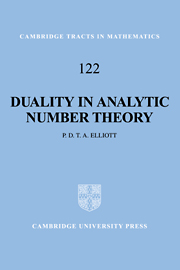Book contents
- Frontmatter
- Contents
- Acknowledgements
- Preface
- Notation
- Introduction
- 0 Duality and Fourier analysis
- 1 Background philosophy
- 2 Operator norm inequalities
- 3 Dual norm inequalities
- 4 Exercises: Including the Large Sieve
- 5 The method of the stable dual (1): Deriving the approximate functional equations
- 6 The method of the stable dual (2): Solving the approximate functional equations
- 7 Exercises: Almost linear, Almost exponential
- 8 Additive functions of class ℒα. A first application of the method
- 9 Multiplicative functions of the class ℒα: First Approach
- 10 Multiplicative functions of the class ℒα: Second Approach
- 11 Multiplicative functions of the class ℒα: Third Approach
- 12 Exercises: Why the form?
- 13 Theorems of Wirsing and Halász
- 14 Again Wirsing's Theorem
- 15 Exercises: The prime number theorem
- 16 Finitely distributed additive functions
- 17 Multiplicative functions of the class ℒα. Mean value zero
- 18 Exercises: Including logarithmic weights
- 19 Encounters with Ramanujan's function τ(n)
- 20 The operator T on L2
- 21 The operator T on Lα and other spaces
- 22 Exercises: The operator D and differentiation. The operator T and the convergence of measures
- 23 Pause: Towards the discrete derivative
- 24 Exercises: Multiplicative functions on arithmetic progressions. Wiener phenomenon
- 25 Fractional power Large Sieves. Operators involving primes
- 26 Exercises: Probability seen from number theory
- 27 Additive functions on arithmetic progressions: Small moduli
- 28 Additive functions on arithmetic progressions: Large moduli
- 29 Exercises: Maximal inequalities
- 30 Shift operators and orthogonal duals
- 31 Differences of additive functions. Local inequalities
- 32 Linear forms in shifted additive functions
- 33 Exercises: Stability. Correlations of multiplicative functions
- 34 Further readings
- 35 Rückblick (after the manner of Johannes Brahms)
- References
- Author index
- Subject index
Introduction
Published online by Cambridge University Press: 05 November 2011
- Frontmatter
- Contents
- Acknowledgements
- Preface
- Notation
- Introduction
- 0 Duality and Fourier analysis
- 1 Background philosophy
- 2 Operator norm inequalities
- 3 Dual norm inequalities
- 4 Exercises: Including the Large Sieve
- 5 The method of the stable dual (1): Deriving the approximate functional equations
- 6 The method of the stable dual (2): Solving the approximate functional equations
- 7 Exercises: Almost linear, Almost exponential
- 8 Additive functions of class ℒα. A first application of the method
- 9 Multiplicative functions of the class ℒα: First Approach
- 10 Multiplicative functions of the class ℒα: Second Approach
- 11 Multiplicative functions of the class ℒα: Third Approach
- 12 Exercises: Why the form?
- 13 Theorems of Wirsing and Halász
- 14 Again Wirsing's Theorem
- 15 Exercises: The prime number theorem
- 16 Finitely distributed additive functions
- 17 Multiplicative functions of the class ℒα. Mean value zero
- 18 Exercises: Including logarithmic weights
- 19 Encounters with Ramanujan's function τ(n)
- 20 The operator T on L2
- 21 The operator T on Lα and other spaces
- 22 Exercises: The operator D and differentiation. The operator T and the convergence of measures
- 23 Pause: Towards the discrete derivative
- 24 Exercises: Multiplicative functions on arithmetic progressions. Wiener phenomenon
- 25 Fractional power Large Sieves. Operators involving primes
- 26 Exercises: Probability seen from number theory
- 27 Additive functions on arithmetic progressions: Small moduli
- 28 Additive functions on arithmetic progressions: Large moduli
- 29 Exercises: Maximal inequalities
- 30 Shift operators and orthogonal duals
- 31 Differences of additive functions. Local inequalities
- 32 Linear forms in shifted additive functions
- 33 Exercises: Stability. Correlations of multiplicative functions
- 34 Further readings
- 35 Rückblick (after the manner of Johannes Brahms)
- References
- Author index
- Subject index
Summary
Du Doppeltgänger! du bleicher Geselle!
H. Heine.In this volume I give a unified account of a method in the analytic theory of numbers: the method of the stable dual. The method is particularly effective in the study of arithmetic functions possessing algebraic structure.
The reader may check details of selected applications of the method; turn to the continuing developments discussed in the penultimate chapter; press on to the new. However, works in analysis, especially in analytic number theory, can seem formless. The leading thread, as Hadamard would have called it, [91] p. 105, becomes obscured by a mass of detail. All too often the conclusion will appear atop a pyramid of small steps, each step apparently insignificant. Sometimes this is due to the nature of the subject; sometimes it is not.
As footnote 2 on page 136 of his book [114], Lakatos makes the following remark:
Rationalists doubt that there are methodological discoveries at all. They think that method is unchanging, eternal. Indeed methodological discovers are very badly treated. Before their method is accepted, it is treated like a cranky theory; after it is treated as a trivial commonplace.
Experience has convinced me of the validity of this statement. Analytic number theory is a dynamic subject, with partial results as moments of clarity. There rarely comes a static final result. Indeed, analytic number theory is largely concerned with method. An heterogeneous nature, allowing opportunities to exhibit frailties of human psychology, gives it a forbidding aspect.
- Type
- Chapter
- Information
- Duality in Analytic Number Theory , pp. xiii - xviiiPublisher: Cambridge University PressPrint publication year: 1997
- 2
- Cited by

